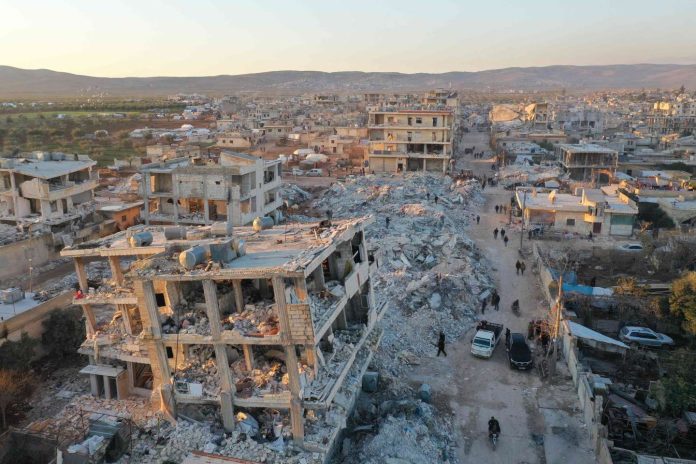Has the world really abandoned the people of Syria? Why have the people of the rest of the world found themselves saying: “Is there anything more than we could have done?” Why?
In front of the United Nations, member countries of Syria and Turkey, under the respective leadership of arc enemy presidents Bashar al-Assad and Recep Tayyip Erdogan, are at war; with the latter working for dethroning the former. At the same time, Assad has domestic problems with “rebels” compared to Erdogan’s perceived cross-border “terrorists”. Members of both groups live side by side in the same Syrian territory. The worst earthquake of the century, tagged Turkey-Syria, has struck. It knows no rebel or terrorist. It just hit these already displaced and brutalized people for almost 12 years of war, suffering under unlivable conditions ever before, spelling their terrible fate and leaving them with little more than non-arriving promises of help.
The story is datelined Beirut (Lebanon) – not Damascus (Syria) or Ankara (Turkey). It is about “…the slow humanitarian response to the severely affected and besieged opposition-held northwest Syria…highlighting the inadequacy of the United Nations Security Council mandated cross border and aid mechanism…” A spokesperson of a Syria civic volunteer group tells the Human Rights Watch (HRW) that its 1,600 volunteers had been left to conduct search and rescue operations alone and that the situation was desperate. “Volunteers are digging with their own bare hands (when) every fifteen seconds matter.”
In the first three disaster days, at least two dozen shipments of relief aid are sent to the Syrian regime in Damascus. None reaches areas under the opposition control in northwest Syria. The only rescue teams that crossed into the Idlib area were a small group of volunteers from Egypt and a team from Spain. A prescheduled UN convoy carrying not emergency aid, not heavy equipment or disaster relief, but blankets and basic supplies came on the fourth day. The pleas of White Helmets and other Syrians desperate to save the lives of their loved ones echoed around the world without response, unheard and unheeded.
When rescue crews and disaster relief was dispatched in a matter of hours from distant places such as Venezuela, Canada and Iceland, why did the victims of this disaster in Turkey and displaced and traumatized Syrians trapped in opposition-controlled areas still get abandoned at a time of great need? Why? Why have the people of Syria turned out to be inhabitants of the neglected part of the much acclaimed small global village?
Five days after the disaster, World Health Organization (WHO) chief Tedros Adhanom Chebreyesus says he is accompanying about 37 metric tonnes of medical supplies to the war and quake-torn Syrian city of Aleppo. He tours some hospitals and shelters. He says: “We are very happy that we could come with supplies. This is the first we are sending…” According to WHO regional director for East Mediterranean, the earthquake left alone, Syria health system has been ravaged by years of conflict— almost 50% of health facilities not functioning and those which are functioning are lacking equipment, lacking staff, lacking medications.
The Syrian government has a history of obstructing aid to the northwest of the country. The question is: “Why? How does this happen?” For an informed answer, we have to go through the UN corridors and revisit policies of the organization’s east (Russian Federation) and west (United States) poles in the perspective of Turkey, Syria and the region.
A transcript of a four-minute interview between NPR’s A. Martinez and US Ambassador to Turkey Jeff Flake gives some lead. Martinez asked: “…with only one recognized border crossing, the aid is not necessarily getting to the rebel-held northwest part of Syria. And the US is urging the UN Security Council to vote immediately to authorize two more crossings. Ambassador, how does the US make sure the aid actually gets to places and people that need it, considering how shaky the security situation can be there?”
FLAKE responded: “It is far more difficult in particularly in northwest Syria, where you have a mix of regime-controlled … and rebel-controlled areas or opposition areas. And – but we have humanitarian partners that are working there for a while that are providing relief irrespective of who controls the area. We just want to provide humanitarian relief. Obviously it’s more difficult given the situation. Turkey is in a better place there because you have a very functioning government and experienced, just kind of overwhelmed everyone is – by this tragedy…We’re only acting, you know, at the request of our Turkish counterparts… We’re doing that in partnerships with Samaritan’s Purse and other nonprofit organizations…”
In other words, with or without the quake, US interests in the region still matter a lot.
The story of the Russian Federation is long. Ahead of the July 2021 United Nations General Assembly (UNGA) meeting to discuss the Russian veto of a Security Council resolution which would have allowed the UN to continue delivery of cross border aid to northwest Syria for one year, Amnesty International Secretary General said: “Member states must not allow the cynical exploitation of vital humanitarian issues to be a political bargaining chip at the UNSC. This meeting must be the start of the UNGA assuming responsibility towards protecting those most in need of humanitarian assistance, without compromise. The GA must state unequivocally: International law is clear; the Security Council authorization should not be needed to deliver humanitarian aid to those in need. The Syrian government and the Russian veto power must not stand in the way of providing humanitarian assistance to millions of civilians in desperate need in northwest Syria, as this amounts to violation of their rights to life, to an adequate standard of living including housing, water and sanitation and to health.
“The UNGA and other actors cannot sit back and simply wait for millions to risk losing access to humanitarian aid, nor can they have any trust that the Russian government will not again abuse its veto to finally close this essential crossing in January when the mandate expires. They must do everything
All the same, Russia vetoed a UN Security Council resolution that would have allowed the UN to deliver cross border aid to Syria for one year without the Syrian government authorization. In the last minute deal after the expiry of the cross-border mandate Security Council members capitulated to Russia’s demand and agreed to a resolution opening the Bab al-Hawa crossing point for only six more months. A General Assembly plenary meeting was called to discuss the matter for which the veto was cast with the entire UN membership.
This explains the UN toothless position over the delivery of humanitarian aid to Syria conflict areas now under the scourge of the earthquake aftermath. But looked at critically we see the entire UN body echoing volunteers’ voices saying: “We hear people screaming but we cannot do anything”. In between the people suffer unto death. This is why a week after the earthquake we see Syria President Bashar al-Assad issuing a three-month authorization for UN deliveries to pass through two more crossings to the besieged northwest from Turkey. Until then the Syrian government, with support from its long-time ally, Russia, rejected the use of other border crossings from Turkey into northwest Syria insisting that all aid must come via government-controlled areas.
The Deputy Middle East Human Rights Watch Director Adam Google was right in saying “three months is too little…too late.” The UN Humanitarian Chief Martin Griffiths becomes more right when he acknowledges that six days after the earthquake struck, the UN had failed the people of northwest Syria.
In the worst scenario, all this is happening in the background of international humanitarian law which says that no party to a conflict may arbitrarily refuse offers to carry out relief operations that are impartial and humanitarian in nature, including cross-border humanitarian assistance. In fact, they should facilitate the provision of humanitarian assistance in need. Using starvation of civilians as a method of warfare, including by impeding relief supplies is a war crime.
Why has the rest of the world abandoned the people of Syria in dire need of humanitarian aid? Could this illustrate what the Amnesty International chief saw as “the cynical exploitation of vital humanitarian issues …?”
By: Felix Kaiza
Source: Politurco.com
Felix Kaiza is a Tanzanian journalist with more than 50 years of experience currently working as an independent media consultant. Learned in agriculture, journalism, political science and international relations, his main fields of consultancy, besides the media, are good governance, nature conservation, tourism and investment. He was the first Tanzanian Chief Sub-Editor of an English daily newspaper in 1970, he has been behind the establishment and growth of the national independent media since the early 1990s. He is UNFAO Fellow Journalist since 1975 and has wide experience on regional integration. He worked on the Information Directorate of the original East African Community on whose ashes survive the current one. His ambition is to brand Tanzania in the inbound market with made-in-Tanzania brands, including information, almost all of which is currently foreign brewed.



